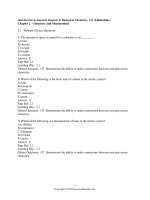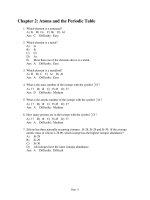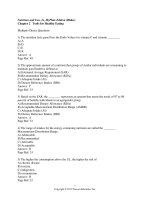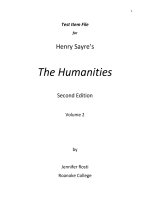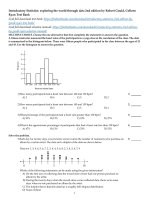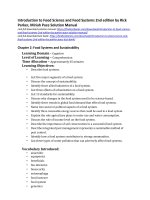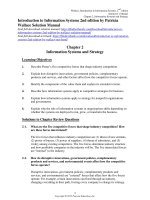Introduction to food science and food systems 2nd edition by parker pace test bank
Bạn đang xem bản rút gọn của tài liệu. Xem và tải ngay bản đầy đủ của tài liệu tại đây (297.13 KB, 4 trang )
Name:
Class:
Date:
Introduction to Food Science and Food Systems 2nd edition by Rick Parker,
Miriah Pace Test Bank
Link full download test bank: />Link full download solution manual: />
CHAPTER 02—FOOD SYSTEMS AND SUSTAINABILITY
True / False
1. What constitutes a food system and what sustainable means can both vary.
a. True
b. False
ANSWER:
True
REFERENCES: INTRODUCTION
2. Food is a global commodity.
a. True
b. False
ANSWER:
True
REFERENCES: FOOD-SYSTEM DEFINITIONS.
3. The food industry is low volume and high-markup.
a. True
b. False
ANSWER:
False
POINTS:
1
REFERENCES: FOOD-SYSTEM DEFINITIONS
4. Consumer food expenditures in recent years have shown a shift toward the consumption of higher value food products
by high-income consumers but not lower-income consumers.
a. True
b. False
ANSWER:
False
REFERENCES: FOOD-SYSTEM TRENDS
5. Urbanization, like the economy, goes in cycles.
a. True
b. False
ANSWER:
False
REFERENCES: FOOD-SYSTEM TRENDS
6. Packaged food products account for large shares of total food expenditures among consumers in high-income countries
because of demand for convenience.
a. True
b. False
ANSWER:
True
POINTS:
1
Copyright Cengage Learning. Powered by Cognero.
Page 1
Name:
Class:
Date:
CHAPTER 02—FOOD SYSTEMS AND SUSTAINABILITY
REFERENCES: FOOD-SYSTEM TRENDS
7. Technical innovations such as ingredient modifications, new processing methods, new packaging methods, and cooking
advances create change in a food system.
a. True
b. False
ANSWER:
True
POINTS:
1
REFERENCES: FOOD-SYSTEM TRENDS
8. Scientists and leaders understand that sustainable food production is about feeding the world's population rather than
focusing on the environment and social issues.
a. True
b. False
ANSWER:
False
POINTS:
1
REFERENCES: DEFINING SUSTAINABILITY
9. There are 13 standards that a sustainable system of food production must meet.
a. True
b. False
ANSWER:
True
POINTS:
1
REFERENCES: STANDARDS OF SUSTAINABLE FOOD PRODUCTION
10. Water is a critical resource for all agricultural production and food processing.
a. True
b. False
ANSWER:
True
POINTS:
1
REFERENCES: SUMMARY
Multiple Choice
11. _____ refers to anything that can be maintained at a certain rate or level.
a. Ecological food system
b. Standard protocols
c. Sustainable
d. Invariable
ANSWER:
c
POINTS:
1
REFERENCES: INTRODUCTION
Copyright Cengage Learning. Powered by Cognero.
Page 2
Name:
Class:
Date:
CHAPTER 02—FOOD SYSTEMS AND SUSTAINABILITY
12. Food systems can be divided into five major segments; a potential sixth segment would be _____.
a. consumption
b. waste and disposal
c. consumer feedback
d. research and development
ANSWER:
b
POINTS:
1
REFERENCES: FOOD-SYSTEM DEFINITIONS
13. The _____ segment of a food system includes such industries as farming, ranching, orchard management, fishing, and
aquaculture.
a. administration
b. research
c. management
d. production
ANSWER:
d
POINTS:
1
REFERENCES: FOOD-SYSTEM DEFINITIONS
14. _____ is an example of an allied industry.
a. Packaging
b. Production
c. Manufacturing
d. Distribution
ANSWER:
a
POINTS:
1
REFERENCES: FOOD-SYSTEM DEFINITIONS
15. Global food retail sales are about _____ annually.
a. $1 trillion
b. $4 trillion
c. $33 billion
d. $450 billion
ANSWER:
b
POINTS:
1
REFERENCES: FOOD-SYSTEM DEFINITIONS
16. As income grows, consumers in lower income countries shift their food purchases _____.
a. away from high-fat products toward carbohydrateb. away from meat and dairy products toward
rich food products
carbohydrate-rich foods
c. away from carbohydrate-rich food toward
d. away from carbohydrate-rich foods toward meat
vegetarian/vegan products
and dairy products
ANSWER:
d
POINTS:
1
REFERENCES: FOOD-SYSTEM TRENDS
Copyright Cengage Learning. Powered by Cognero.
Page 3
Name:
Class:
Date:
CHAPTER 02—FOOD SYSTEMS AND SUSTAINABILITY
17. Scientists working in the food system _____.
b. must continue their experiments until they have
a. can never be absolutely certain that an experiment has
eliminated all of the variables that might
eliminated all of the variables that might influence its
influence the results
results
c. are required by the FDA to perform, identify, and
d. rely on absolute certainties in their
document all of the possible variables that could
experiments to ensure food safety in the
influence the results of an experiment
products that they test and approve
ANSWER:
a
POINTS:
1
REFERENCES: STANDARDS OF SUSTAINABLE FOOD PRODUCTION
18. _____ is the process of planning and executing the conception, pricing, promotion, and distribution of ideas,
goods, and services to create exchanges that satisfy individual and organizational objectives.
a. Production
b. Research
c. Distribution
d. Marketing
ANSWER:
d
POINTS:
1
REFERENCES: STANDARDS OF SUSTAINABLE FOOD PRODUCTION
19. _____ risk-management options include production risks and marketing risks.
a. Insurance
b. Noninsurance
c. Assurance
d. Nonassurance
ANSWER:
b
POINTS:
1
REFERENCES: STANDARDS OF SUSTAINABLE FOOD PRODUCTION
20. _____ control is the use of living organisms such as parasites, predators, and pathogens to maintain pest
populations below economically damaging levels.
a. Mechanical
b. Physical
c. Biological
d. Chemical
ANSWER:
c
POINTS:
1
REFERENCES: STANDARDS OF SUSTAINABLE FOOD PRODUCTION
Copyright Cengage Learning. Powered by Cognero.
Page 4
